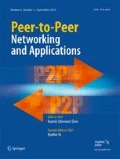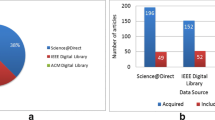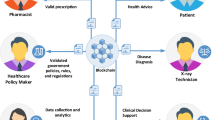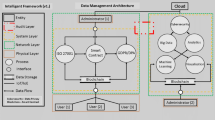Abstract
Nowadays, the development of traditional business models become more and more mature that people use them to guide various kinds of E-business activities. Internet of things (IoT), being an innovative revolution over the Internet, becomes a new platform for E-business. However, old business models could hardly fit for the E-business on the IoT. In this article, we 1) propose an IoT E-business model, which is specially designed for the IoT E-business; 2) redesign many elements in traditional E-business models; 3) realize the transaction of smart property and paid data on the IoT with the help of P2P trade based on the Blockchain and smart contract. We also experiment our design and make a comprehensive discuss.






Similar content being viewed by others
References
Atzori L, Iera A, Morabito G (2010) The Internet of things: A survey[J]. Comput Netw 54(15):2787–2805
Li H, Tian Y, Liu Y, etal UAI-IOT Framework: A Method Of Uniform Interfaces to Acquire Information from Heterogeneous Enterprise Information Systems[C]//Green Computing and Communications (GreenCom), 2013 IEEE and Internet of Things (iThings/CPSCom), IEEE International Conference on and IEEE Cyber, Physical and Social Computing. IEEE, 2013: 724– 730
Haller S, Karnouskos S, Schroth C (2009) The internet of things in an enterprise context[M]//Future internetFIS 2008. Springer, Berlin, pp 14–28
Bucherer E, Uckelmann D (2011) Business models for the internet of Things[M]//Architecting the internet of things. Springer, Berlin, pp 253–277
Nakamoto S (2012) Bitcoin: A peer-to-peer electronic cash system[J]. Consulted 2008:1
Leminen S, Westerlund M, Rajahonka M, etal (2012) Towards iot ecosystems and business models[M]//Internet of things, smart spaces, and Next Generation Networking. Springer, Berlin, pp 15–26
Amit R, Zott C (2000) Value drivers of e-commerce business models[M] INSEAD
Chesbrough H, Rosenbloom RS (2002) The role of the business model in capturing value from innovation: evidence rom Xerox Corporation’s technology spinoff companies[J]. Ind Corp Chang 11(3):529–555
Liu X, Dong M, Ota K, etal (2015) Service pricing decision in cyber-physical systems: insights from game theory. IEEE Transactions on Services Computing. doi:10.1109/TSC.2015.2449314
Timmers P (1998) Business models for electronic markets[J]. Electron Mark 8(2):3–8
Amit R, Zott C (2001) Value creation in ebusiness[J]. Strateg Manag J 22(6-7):493–520
Osterwalder A, Pigneur Y An e-business model ontology for modeling e-business[C]//15th Bled electronic commerce conference. Bled, Slovenia, 2002:17–19
Tikkanen H, Lamberg JA, Parvinen P et al. (2005) Managerial cognition, action and the business model of the firm[J]. Manag Decis 43(6):789–809
Zott C, Amit R (2008) The fit between product market strategy and business model: implications for firm performance[J]. Strateg Manag J 29(1):1–26
Zott C, Amit R (2009) Designing your future business model: An activity system perspective[J]
Westerlund M, Rajala R, Leminen S (2011) Insights into the dynamics of business models in the media industry[J]
Bohn J, Coroam V, Langheinrich M, etal (2005) Social, economic, and ethical implications of ambient intelligence and ubiquitous computing[M]//Ambient intelligence. Springer, Berlin, pp 5– 29
Fleisch E What is the internet of things? An economic perspective[J]. Economics, Management, and Financial Markets, 2010 (2): 125-157
Palo T, Tahtinen J (2011) A network perspective on business models for emerging technology-based services[J]. J Bus Ind Mark 26(5):377–388
Osterwalder A, Pigneur Y (2010) Business model generation: a handbook for visionaries, game changers, and challengers[M] John Wiley Sons
Author information
Authors and Affiliations
Corresponding author
Rights and permissions
About this article
Cite this article
Zhang, Y., Wen, J. The IoT electric business model: Using blockchain technology for the internet of things. Peer-to-Peer Netw. Appl. 10, 983–994 (2017). https://doi.org/10.1007/s12083-016-0456-1
Received:
Accepted:
Published:
Issue Date:
DOI: https://doi.org/10.1007/s12083-016-0456-1




